Key takeaways:
- Dyslexia is a specific learning disability affecting reading, writing, and language processing, not related to intelligence.
- Symptoms of dyslexia include difficulties in reading, spelling, concentration, and organization, which can lead to frustration and self-doubt.
- Dyslexia training enhances self-esteem by providing targeted strategies and fostering a supportive community for individuals facing similar challenges.
- Online tools, such as text-to-speech software and interactive applications, can significantly aid dyslexia by accommodating different learning preferences and needs.
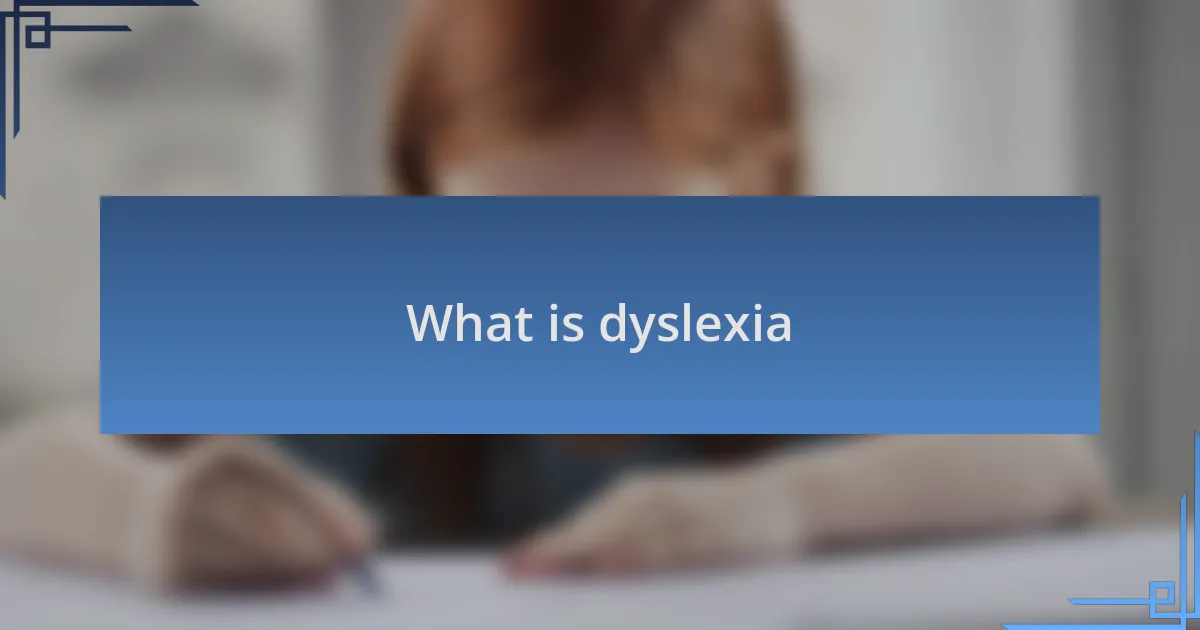
What is dyslexia
Dyslexia is a specific learning disability that affects reading and related language-based processing skills. From my own experience, I remember the frustration of skimming through text, only to feel like the words were dancing off the page. It’s not about intelligence—many people with dyslexia are quite bright; it’s just that the way our brains process language is different.
Imagine trying to read a book, and the letters seem to shift and blur. That sensation can be a daily reality for those with dyslexia. It often brings a rush of emotions—ranging from confusion to self-doubt—as individuals grapple with tasks that seem straightforward to others. Have you ever felt out of sync with the words around you? For many, that’s what it feels like when facing dyslexia.
At its core, dyslexia is about more than just reading. It can impact writing, spelling, and sometimes even math. Reflecting on my academic journey, I often found myself relying on alternative methods to showcase my understanding. It prompted me to seek out creative solutions, which ultimately deepened my appreciation for learning in various forms.
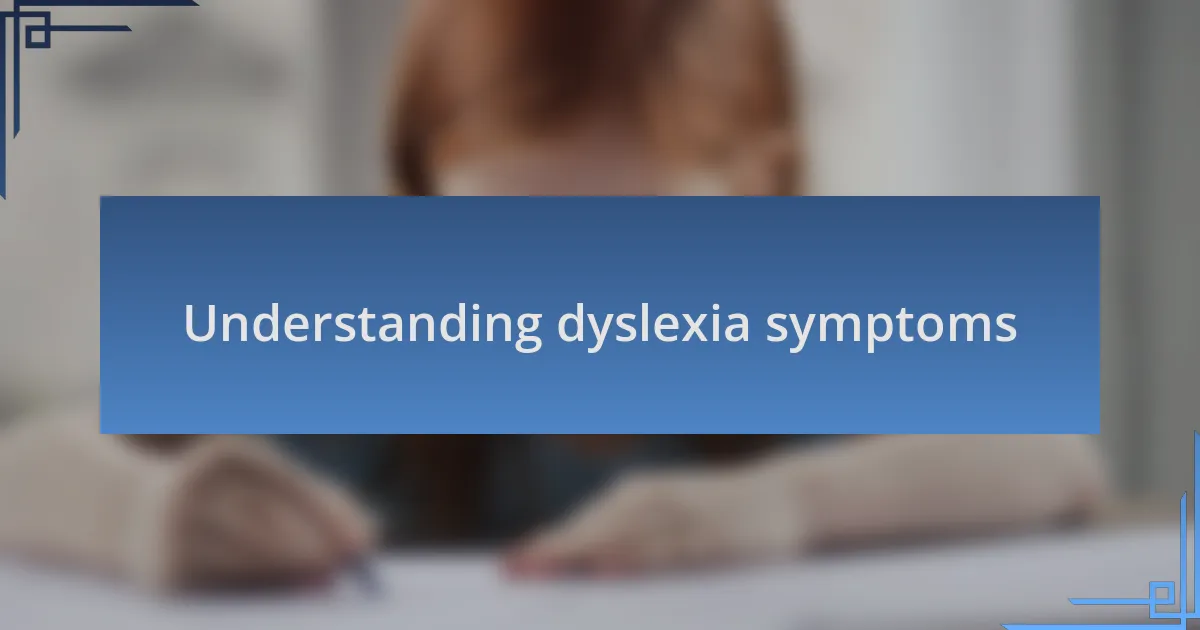
Understanding dyslexia symptoms
Dyslexia symptoms can vary widely, and it’s important to recognize that not everyone experiences the same signs. For me, it often manifested as a struggle with decoding simple words, leaving me frustrated during classroom reading sessions. Have you ever noticed a child avoid reading aloud? This might stem from a fear of feeling lost among their peers, a feeling that resonates deeply when you’re faced with letters that just won’t align properly.
Another common symptom is difficulty with spelling. I vividly recall spending late nights trying to get a grip on certain words that seemed to mock me from the page. It’s more than just mixing up letters; it’s a challenge that can sap motivation and lead to a sense of inadequacy. Have you had moments where a minor spelling error felt like a major setback? That’s a shared experience for many of us with dyslexia.
Beyond reading and writing, dyslexia can affect concentration and organization. I often found myself distracted, not because I wasn’t interested, but because my brain was juggling too many thoughts. Have you felt overwhelmed when attempting to follow a multi-step instruction? Understanding these symptoms is crucial, as awareness can foster support rather than misunderstanding, which is something I’ve personally battled throughout different stages of my life.
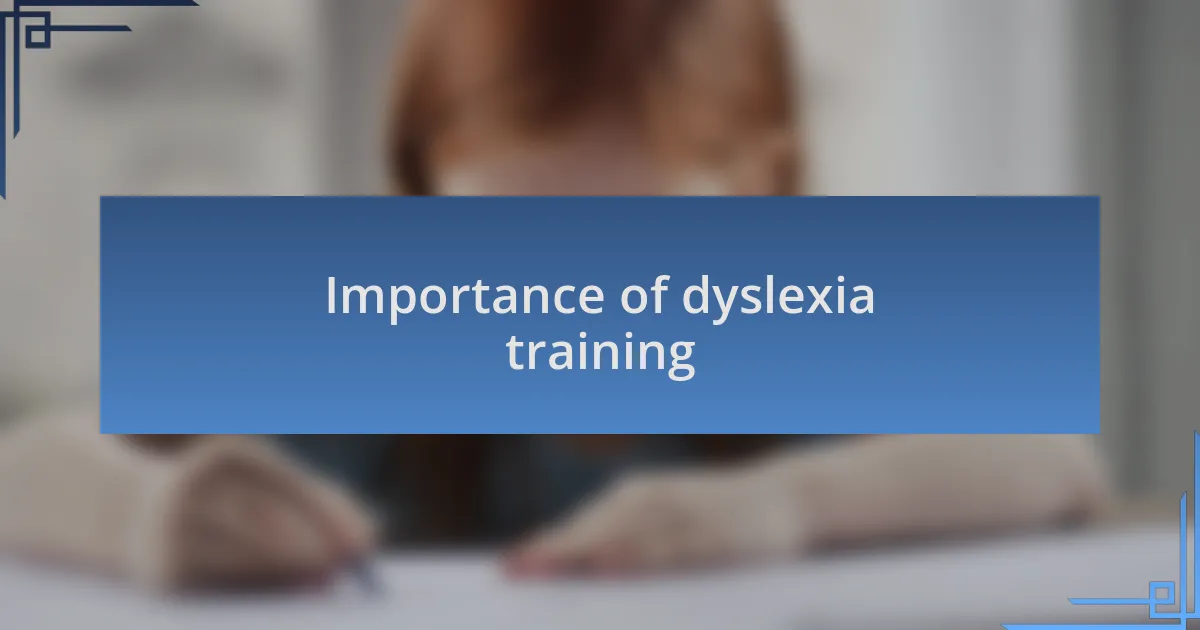
Importance of dyslexia training
Dyslexia training plays a pivotal role in boosting self-esteem and confidence among individuals with this learning difference. When I first engaged in targeted training, it felt like someone had flipped a switch; the tools I learned transformed my ability to tackle reading tasks that once seemed insurmountable. Is there any greater relief than finally feeling equipped to face something that has long felt impossible?
Moreover, training offers essential strategies tailored to individual needs. I remember practicing phonemic awareness exercises, which initially felt tedious, but over time, they drastically improved my decoding skills. Have you experienced the satisfaction of mastering something challenging? That moment happens when training builds a foundation for success, turning frustration into accomplishment.
Lastly, dyslexia training fosters a supportive community where struggles can be shared, and victories celebrated. Joining a group of peers who understand the journey made me feel less isolated; it was a reminder that we’re all on this path together. Have you ever had a conversation with someone who just gets it? Those connections can empower us to advocate for ourselves and seek out tools and resources that truly make a difference.
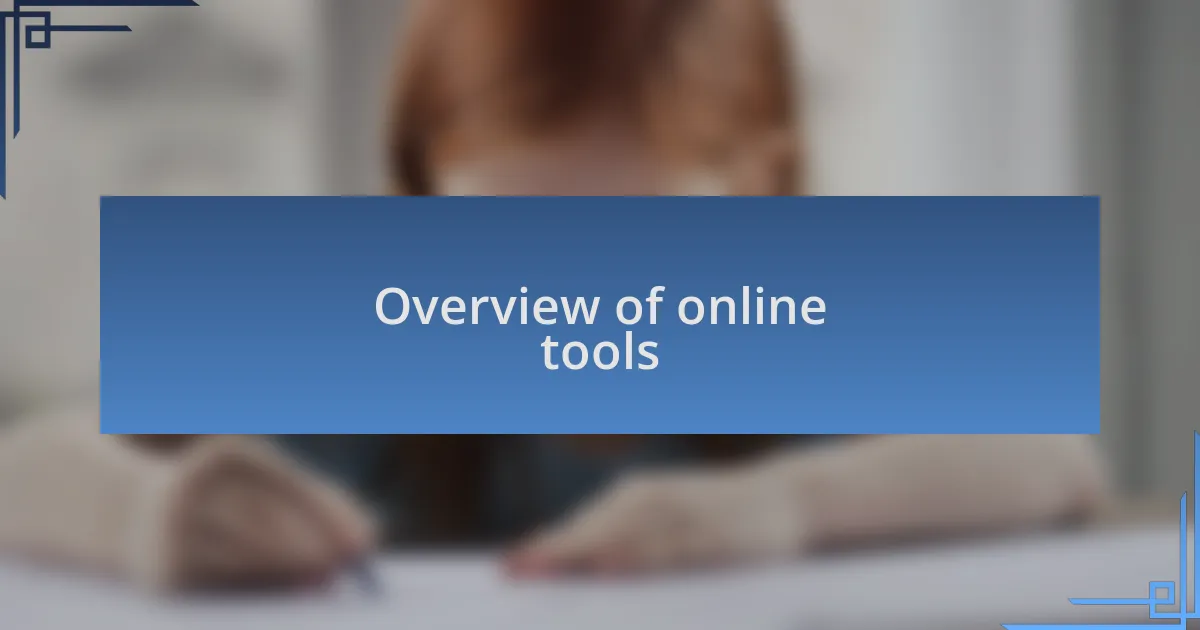
Overview of online tools
Online tools for dyslexia are becoming increasingly vital for individuals seeking to enhance their reading and writing skills. I recall the first time I used a text-to-speech software; it felt like I had gained a superpower. Hearing words read aloud allowed me to grasp their meaning without the stress of decoding them on my own. Have you ever found that one tool that just clicks for you? That moment can be truly liberating.
From educational applications to interactive websites, the variety of tools available can cater to different learning preferences. I often switch between apps that focus on phonics, vocabulary, and comprehension. It’s interesting how one day, a game-based approach might resonate with me more than reading a passage, and on another, I might need the straightforward support of a digital dictionary. How do you determine which tool suits your mood or learning style? Experimenting with multiple options has been part of my journey, helping me discover what truly supports my progress.
Many of these online resources also offer personalized features that adapt to individual needs. For instance, I’ve found tools that adjust font styles and text backgrounds, which significantly reduces visual stress for me. Have you noticed how small tweaks can create big changes in comfort and clarity? Discovering the right settings can transform how we engage with written content, making the learning process not just efficient but also enjoyable.

Choosing the right online tools
The process of choosing the right online tools can feel overwhelming, but I’ve learned to focus on what truly works for me. When I first explored various platforms, I jotted down my specific challenges and sought tools that addressed those needs directly. Does that make sense? Finding a tool that offers clear guidance on phonetics or reading comprehension, for instance, can drastically change my learning experience.
I also consider user reviews and recommendations from other individuals with dyslexia when making my choices. I remember stumbling upon a forum where someone shared their success with a particular app, and it motivated me to try it myself. That sense of community made me realize how valuable shared experiences can be. Have you found a recommendation that turned out to be a game-changer for you?
Lastly, I always appreciate free trials or demo versions before committing to a subscription. Testing a tool helps me gauge its fit for my learning style without the pressure of a financial commitment. I once tried a platform that seemed promising but turned out to be too complicated for my needs. Have you ever invested in something only to realize it wasn’t the right match? That’s why I believe in giving myself the freedom to experiment and reflect.
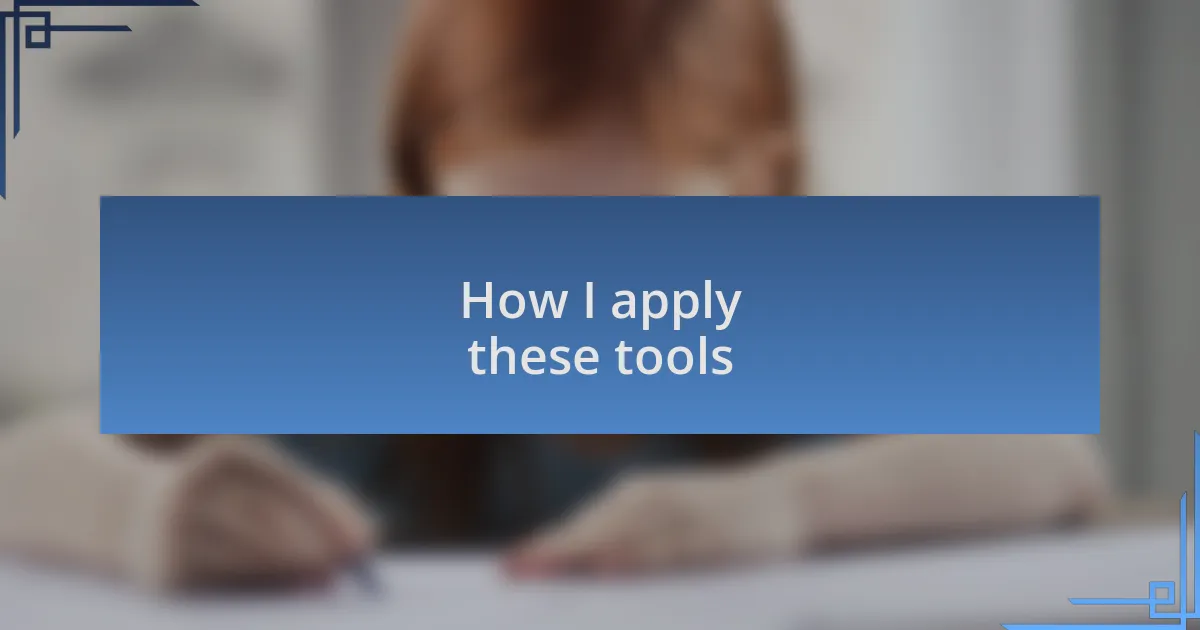
How I apply these tools
Using online tools has become an integral part of my daily routine. For instance, I often utilize text-to-speech software while reading emails and important documents. The way it transforms the written word into clear, audible sounds has significantly reduced my frustration levels. Have you ever found yourself getting lost in a sea of text? This tool helps me stay focused on the message rather than battling the words themselves.
I also love interactive platforms that offer engaging exercises. I recall a time when I struggled with spelling and vocabulary. After discovering a gamified app, I noticed my motivation soared with each level I completed. It felt like I was playing a game rather than learning, which made the process enjoyable. Have you experienced a similar shift in your learning perspective?
Lastly, I make it a habit to integrate these tools into my personal and professional life. I remember a time when I was preparing a presentation; I used a mind-mapping tool to organize my thoughts visually. This approach not only clarified my ideas but also eased my anxiety about public speaking. In what ways could you see these tools enhancing your everyday tasks? From organizing information to enhancing comprehension, I believe these tools can truly transform our experience.